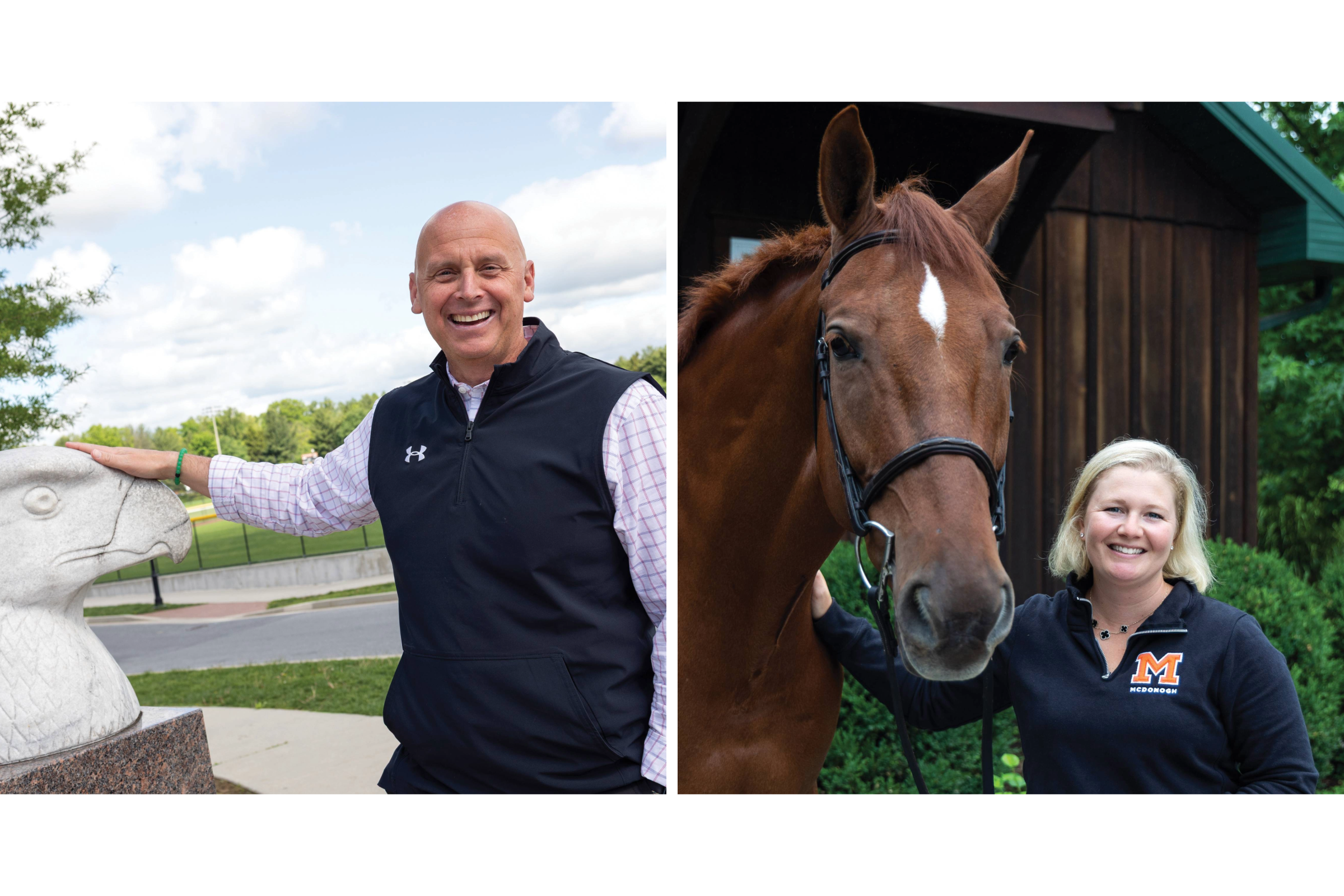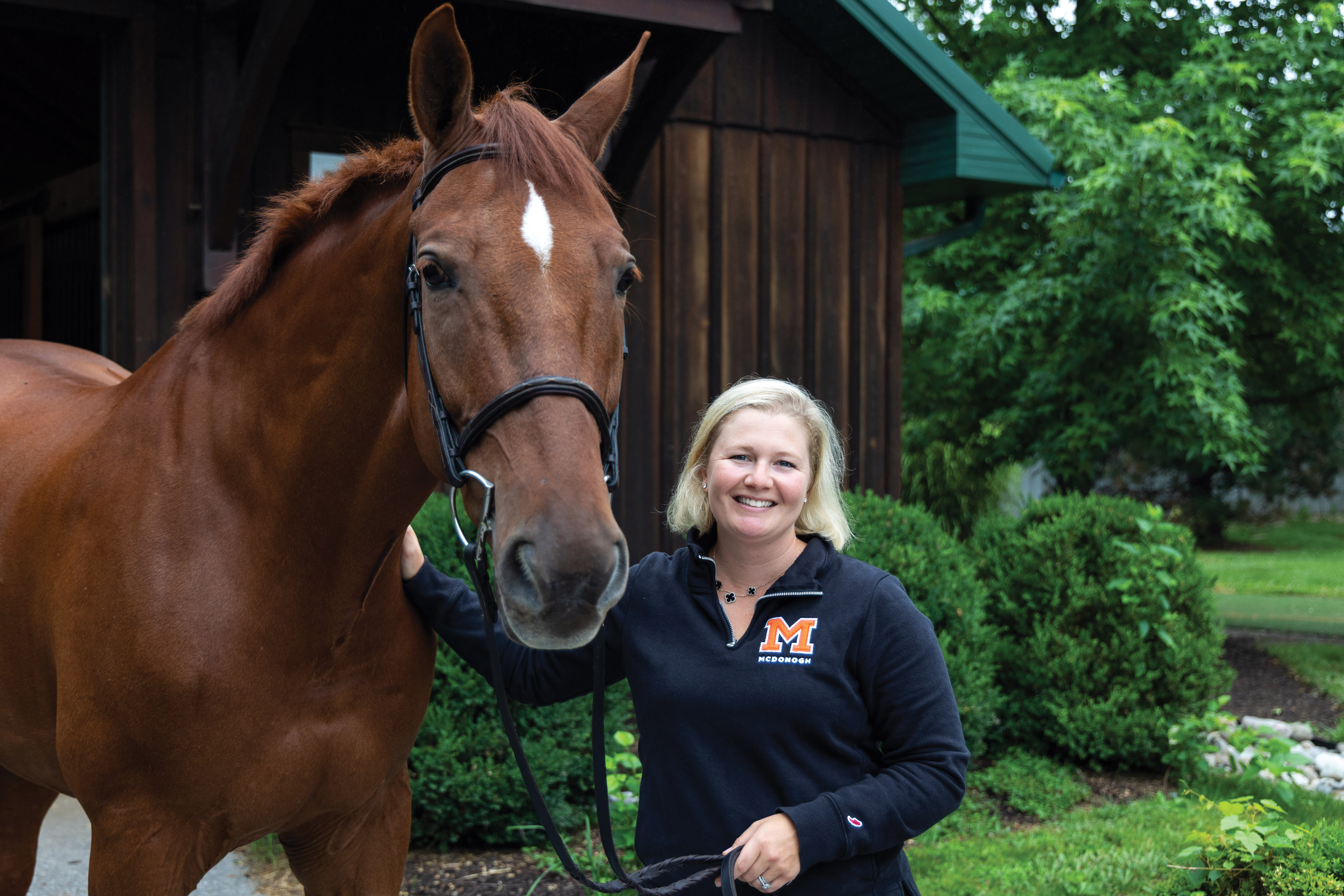
8 minute read
A New Season in Athletics
It's a new season in McDonogh's Athletic Department with the addition of two fresh faces on the leadership roster. Jeff Parsons is now the Athletic Director and Bristol Craft is Director of Equestrian Programs. Neither Parsons nor Craft is a stranger to McDonogh, and they both look forward to working with the students and their teams (including the horses).
Parsons comes to McDonogh after 25 years at his high school alma mater, Archbishop Spalding—also a member of the IAAM and MIAA sports leagues. Well aware of McDonogh's proud tradition of athletic excellence, he's honored to join the ranks of the School's esteemed coaches—eager to inspire the next generation and build upon the legacy of success with passion, purpose, and pride.
Craft began riding at age seven in McDonogh's after-school program and was a competitive rider throughout her school years. She served as a senior equestrian coach at the School from 2013 to 2016, where she played a pivotal role in nurturing young riders. In taking over the reins of the equestrian program, she plans to cultivate a culture of exceptional horsemanship, where riders of all ages discover not only the skill of riding but also the joy, confidence, and lifelong passion that come from a true connection with horses.
Jeff Parsons, Athletic Director

What drew you to McDonogh?
Early in my career as an Athletic Director, Mickey [Deegan] was a mentor to me. She was someone I could pick up the phone and ask, "Hey, what do I do here?" As time went by, I also got to know many of the coaches. I've always admired the School from afar. McDonogh athletics is competitive at the highest level, and that's what I want to be a part of.
How would you describe your role and leadership style?
I'm just a small part of this fantastic place. My role as Athletic Director is to help our coaches and athletes be in a position to be as successful as they possibly can be—to set them up for success. I have been told that I am a player's coach. I'm very collaborative, and I love for coaches to bounce ideas off me. I want coaches to feel that they are empowered to do what's best for their student-athletes.
What are your goals for your first year here?
I want to meet as many people as possible and to learn as much as I can about the traditions and the history of the School. I want to make sure I'm not missing anything.
I also want the athletes on every team, in Middle and Upper School, to feel that their team is the most important on campus. If the coaches and the students feel like they are a priority, it's a positive experience for all.
How would you define success for students and for the athletic program?
Success is an environment in which student-athletes feel like they belong, an environment where they feel like they're accepted. And at the same time, they're competing and working toward something. Success is creating that culture in which, if we do things the right way and work hard, good things will follow.
I don't measure success by the number of championships we win; I measure success by the positive experiences. In every sport, only one team wins the title every year. Win or lose, at the end of the day, in three or four years, the student will remember those positive experiences.
What do you see as the role of athletics in shaping character?
Athletics play a huge role in developing good character. Teams are made up of people from different backgrounds, with different feelings and different thoughts, all working toward a common goal. As part of a team, students learn about leadership, collaboration, and working through adversity. Athletes have to be able to think on the fly and be reactive to what's going on. These are important life skills that our students will carry with them well into the future.
How do you balance competitiveness with student wellness?
Student well-being is always our top priority. In athletics, like academics, we need to find the sweet spot between challenging students to excel and overwhelming them. Today's students face countless demands on their time and energy. Yes, we want to be competitive, but striking a balance is essential to everything we do.
What excites you the most about McDonogh's athletic potential?
McDonogh has such a strong athletic foundation. I'm looking forward to building on our successes and reaching even greater heights. My goal is to honor our legacy while continuing to inspire pride in everyone who is part of this community—past, present, and future.
Bristol Craft, Director of Equestrian Programs

This is not your first rodeo at McDonogh. What have you been doing over the past nine years?
Since I left teaching at McDonogh in 2016, my career has literally prepared me to take the reins here. I honed my business skills by managing consignment operations for three equestrian retail stores and growing their online operations, and at the same time, I ran a premier horse show for five years. Then I went to Cargill Animal Health, where I managed all of the large feed stores in Maryland and Delaware and further developed my knowledge of equine health and nutrition. I'm excited to be back and utilizing all my skills to raise the bar for McDonogh's riders, horses, and horse shows.
What are your goals for McDonogh's equestrian program?
I have many goals—short, intermediate, and long-term. I want to give Lower School students more time at the barn and in the saddle during PE class, and we are working to expand opportunities for riders to compete at all levels of our program. I am exploring the possibility of an interscholastic team to compete against schools like Oldfields and St. Timothy's. We are about to open a second indoor facility, which will allow us to consider expanded lesson offerings and show opportunities.
Does the equestrian program include more than McDonogh students?
The majority of our riders, nearly 85%, are McDonogh students, and we give lessons to 40-50 students after school who are from McDonogh as well as the wider community. We're also expanding our adult riding program, which includes McDonogh alumni and alums of our riding program who board their horses and ride here.
What is your teaching style?
I am very rider and horse-focused. Every rider and every horse is different, making each pair a unique combination. I meet with each rider to learn their goals and style of learning. I also ride every horse, so I understand how each one handles. This allows me to understand what our rider is experiencing and to explain how to get the most from that horse. When the rider learns how to adapt to the animal's needs, they can have more success. I also really love bringing along young horses, meaning teaching each horse how to be more successful with their riders.
So you are teaching both riders and horses?
Yes! The kids are going to make mistakes, and so are the adults. So we teach the horses how to "save" them in a situation where the rider doesn't know what to do. There's a lot of teaching that takes place behind the scenes to educate the horses so we can better fit them with our students. Horses are trainable throughout their whole lives. Sometimes they just have to be reminded of what they know.
What does success look like for students and for McDonogh's equestrian program?
Success depends on the individual riders and their goals. For some children, it will be getting a horse to canter or jump a pole on the ground. For others, it will mean winning a ribbon at a horse show, being a champion, reaching a year-end goal, or moving up a division. In the barn, success is also working through a tough day. For me, success is when a student learns something new or walks out of the barn with a smile.
As for the equestrian program, I want all the stalls filled, the horses healthy, and people from every walk of life to come and enjoy riding. I want to provide students, who may not be able to show at a high level, with affordable opportunities to compete. This is an expensive sport. I was a child who didn't have the money to do this. I had to work to afford limited opportunities. I would love to see an endowment or a scholarship to support these riders.
Do you have a favorite horse?
One of my favorites is Tank. I've known him for years. He's in his 20s and loves his job working with the little kids and the varsity riders. He's our Steady Eddie. He never lets us down.










